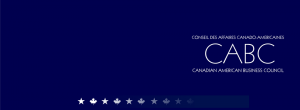Photo: Facebook Page of Canadian American Business Council
WASHINGTON – The next U.S. ambassador to Canada has had his nomination confirmed nearly a year after President Barack Obama tapped him for the job.
Chicago investment banker Bruce Heyman was approved in a vote Wednesday by the U.S. Senate, where partisan wrangling has slowed down the appointment of dozens of senior diplomats.
Heyman was first revealed as the president’s choice last spring, but the post in Ottawa remained vacant for eight months following the departure of the last American ambassador.
“Honored to be confirmed by the Senate today as the next US Ambassador to Canada,” Heyman tweeted Wednesday evening.
“Time to get to work!”
A spokesman for Foreign Affairs Minister John Baird says Canada looks forward to building a strong relationship with Heyman.
The confirmation came several days after a business group, the Canadian American Business Council, expressed frustration over the delay. Canada’s ambassador to the U.S., Gary Doer, sits on the group’s board.
The organization sent a letter to the leaders of both parties in the Senate, chiding the chamber for partisan gamesmanship. Republicans have been holding up ambassadorial appointments, in a move seen as punishment for procedural changes imposed by the Democrats.
The Republicans have also questioned the qualifications of some of the party fundraisers appointed by Obama. There were no such complaints, however, about Heyman whose nomination hearing last year went smoothly.
One of the letter’s two co-authors sang his praises.
“We are delighted,” said the business council’s Maryscott Greenwood, a former U.S. diplomat in Ottawa. She called him the latest in a long line of talented presidential appointees to the Canadian post.
“He’s in for the best job of his life — working on one of the most important, multi-faceted and prosperous relationships the U.S. has ever known.”
The letter said it was wrong to keep quality candidates, like Heyman, in limbo for no reason.
The former Goldman Sachs partner wasn’t really challenged at the hearing, where he only faced a few questions.
In a brief exchange with Republican Sen. John McCain, Heyman declined to offer a position on the Keystone XL pipeline.
In response to a question about intellectual property, however, he did promise to push for tougher laws in Canada. He called American ingenuity the “special sauce” in the country’s economy and pledged to take up concerns, common among U.S. policy-makers, that Canada’s regulatory environment and court system are too lax in punishing copyright infringement.
The delay in confirming Heyman was by no means a record: the post went vacant for 18 months in the 1990s, during the Clinton administration.
Heyman replaces Chicago-born lawyer David Jacobson, who also raised money for Obama’s Democrats.
Many U.S. ambassadorships around the world, particularly in dangerous or in strategically challenging areas, are generally given to career diplomats. Canada, however, is among a group of countries where the post has frequently been occupied by political allies of the president.
But one Canadian observer is skeptical is about the ability of the president — let alone one of his envoys — to deliver much in the administration’s final two years.
“Unfortunately, his late arrival comes at a time when his president is floundering politically with sinking poll numbers. Unless Obama’s fortunes change, we cannot expect Heyman to deliver much even if he has a close relationship with the President,” said Fen Hampson, director of Global Security at the Centre for International Governance Innovation in Waterloo, Ont.
“His will be a hobbled and brief tenure in Ottawa.”
With files from Mike Blanchfield in Ottawa
